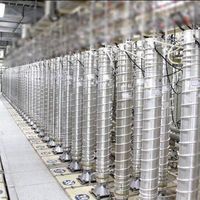Iran’s University Entrance System Heavily Favors The Rich
Students from the wealthiest families have a much greater chance of admission to top universities in Iran, as many blame corruption by the entrance exam ‘mafia’.
In a program aired by the state television Sunday, Mansour Kabkanian, a member of the Supreme Council of the Cultural Revolution, said 48 percent of the hugely sought after 3,000 seats, such as those in medical and engineering schools, are taken by students hailing from the top income percentile families while students from the bottom income brackets only manage to make it to 0.2 percent of top majors.
Only 1.3 of applicants from the bottom three percentiles make it to medical and dentistry schools against 86 percent from the top three, he said, adding that in some engineering fields, such as electrical engineering at Sharif University of Technology, the three bottom percentiles have no chance at all but those from the top three percentiles make up 87 percent of all students admitted.
Many Iranians believe that the standardized university entrance exams, known as Concours, which is usually held at a nationwide scale in summer every year, is responsible for such a huge gap in admission of students from the wealthy and underprivileged families.
They argue that Concours only allows for those with money who can afford not only top private schools, but also preparatory classes and private lessons, expert advice on making the best choices, and even corrupt practices such as purchasing the test questions and their correct answers at astronomical prices.
Those profiting from the lucrative business of running Concours classes and publication of expensive study material have for years used their influence and money to prevent the entrance exam system being replaced by better and fairer methods of student admission to universities, the media have been saying for years.
The Iranian media have dubbed the allegedly profiteering Concours businesses as ‘the Concours Mafia’.
“The Concours mafia has been corrupting the exams for years. In public schools they teach you that 2+2 makes four while in the Concours exam they require you to calculate the mass of the sun in your head,” a critic tweeted.
“The mafia establishes the [exam preparatory] school so that you have to fill their pockets to succeed. Those who create the test questions make them arbitrarily [hard] in order to sell the key to test questions before the exam [to make a profit],” he added.
The term ‘mafia’ is often used by Iranian media to refer to influential groups that ensure their own profits through bribing officials and lawmakers. Critics of the automaking industry, for instance, have said for years that a “mafia-like” influential group is behind a ban on car imports to eliminate competition to Iran's inefficient auto industry where their interests lie.
The head of the higher education ministry’s evaluation organization, Abdolrasoul Pourabbas, claimed earlier this year that corruption in holding Concours has decreased this year as a result of using new methods and devices to uncover cheating during the exams. Last year he had sworn on camera that allegations of corruption were false.
Pourabbas said that “some ringleaders of fraud networks” were arrested in several provinces and added that there are plans to end the Concours. Such statements have been made by various officials for around two decades.
Nearly 1.2 million applicants participated in the exams this year held July 6 and 7 across the country.








